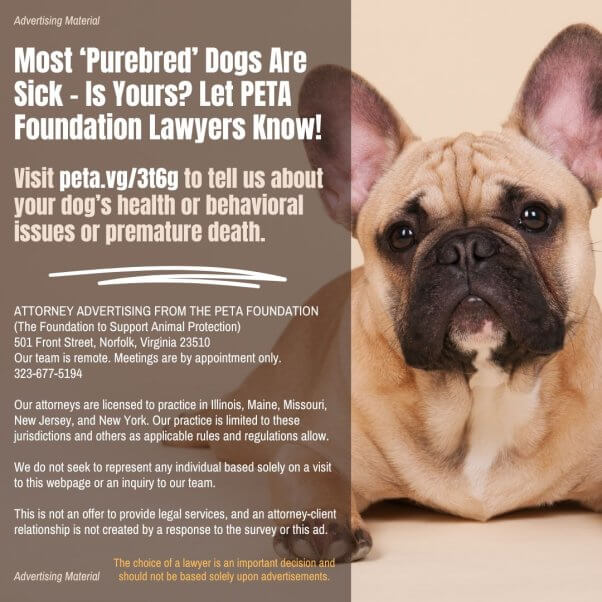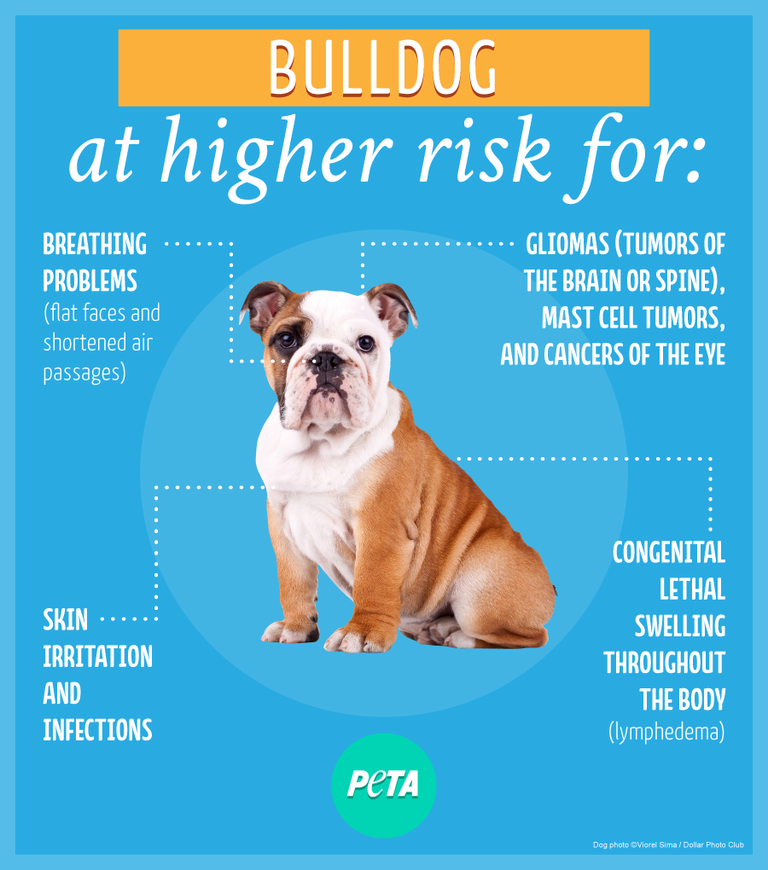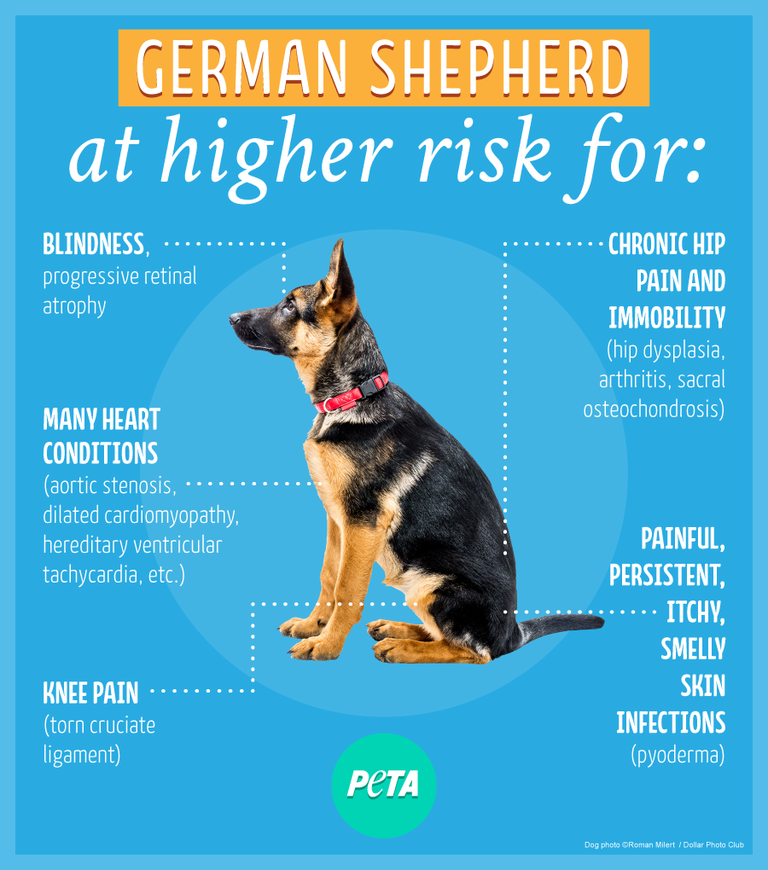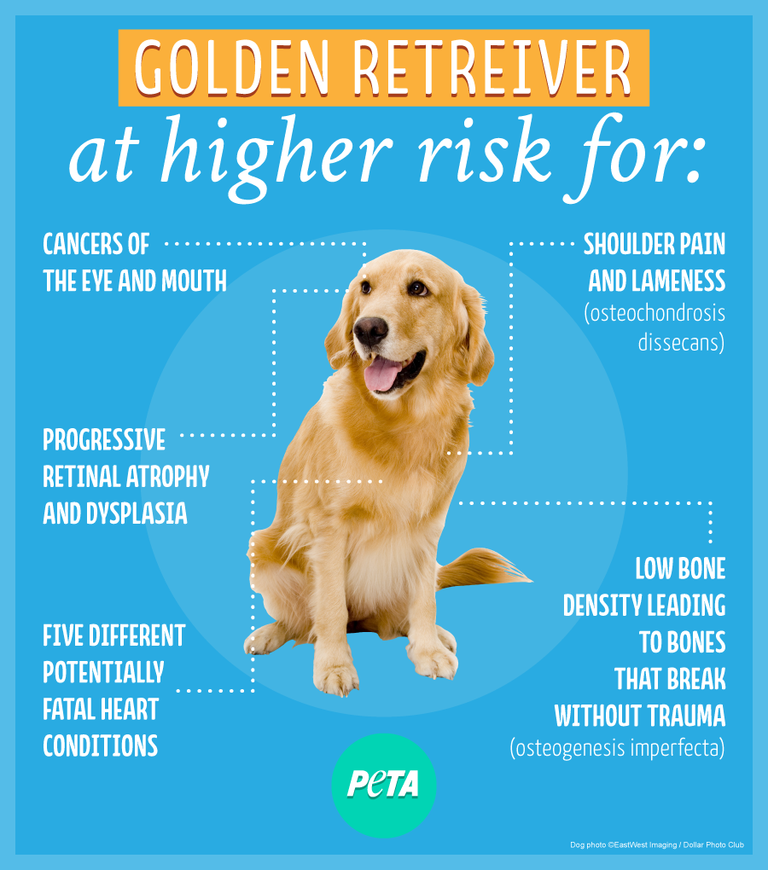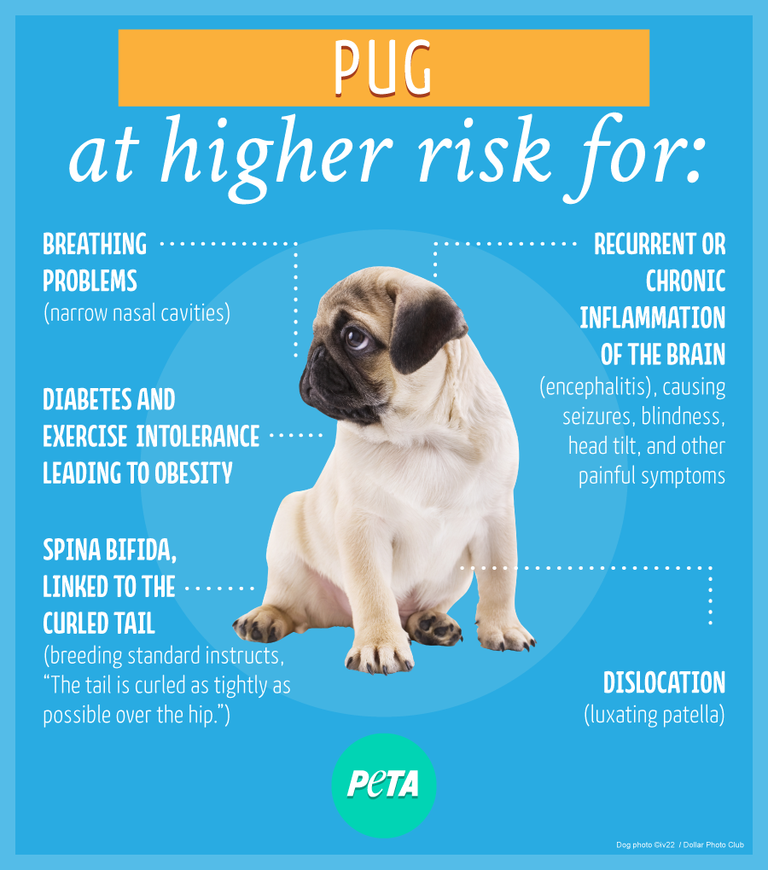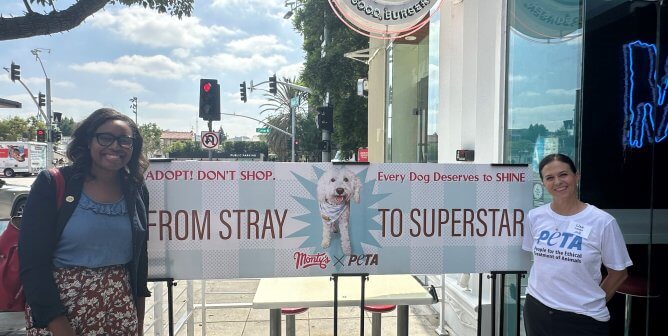Is Your Dog Sick? Health Issues of ‘Purebred’ Dogs You Need to Know About
Breeding “purebred” dogs—dogs with certain genetic traits or appearances—can cause inherited health conditions that can be painful and deadly. The aesthetic standards set by the American Kennel Club (AKC), the group that sanctions the Westminster Kennel Club dog show, among others, can leave many dogs crippled and in nearly constant pain and may even lead to an untimely death. An article in Time magazine estimates that as many as one in four purebred dogs is afflicted with a serious genetic problem. In 2022, Norway became the first country to ban the breeding of English bulldogs and King Charles spaniels over animal welfare concerns related to the medical conditions commonly experienced by these breeds.
Nature didn’t create dog breeds—humans did. There are many health problems that come along with breeding for certain physical attributes.
The issues purebred dogs are predisposed to include the following:
1. Beagles

Beagles face an elevated risk of developing problems, including these:
- Dementia
- Glaucoma
- Herniated discs
- Mammary cancer
2. Bloodhounds

Bloodhounds often have low-slung eyelids and, as a result, are at higher risk of suffering from conditions such as these:
- Chronic eye irritation
- Eye infections
Their floppy ears and wrinkled skin also increase their risk of developing serious ear or skin infections.
3. Boxers

According to research compiled by the Royal Veterinary College in London, boxers are genetically predisposed to 76 different health conditions. These are some of the most common ailments:
- Bloat, a condition in which an animal suffers from excessive gas production in the stomach (It can be fatal if not treated immediately.)
- Cancer
- Eye ulcers
- Irritable bowel syndrome
- Musculoskeletal issues
4. Bulldogs
As a result of selective breeding, bulldogs (also known as “British bulldogs” or “English bulldogs”) often have to be artificially inseminated and give birth via Cesarean section because their heads are too large and their hips are too small to give birth naturally. They also commonly suffer from breathing problems. Learn more in the video below:
The medical conditions afflicting bulldogs are so severe that Norway banned the breeding of British bulldogs after a court there ruled that the dogs could never be considered healthy.
5. Cavalier King Charles Spaniels

These spaniels have been bred to have unnaturally shaped skulls, which can cause a condition called syringomyelia, in which the skull is too small for the brain, forcing brain tissue to protrude through the base of the skull and put pressure on the spinal cord. It’s estimated that more than 90% of Cavalier King Charles spaniels suffer from this extremely painful disease. These spaniels are also likely to suffer from several other health issues, including these:
- Brachycephalic obstructive airway syndrome
- Chronic ear infections
- Hip dysplasia
- Mitral valve disease
6. Dachshunds

Dachshunds face a host of health problems. Their long backs and short legs lead to a higher risk of lifelong back, knee, and joint problems. They are also particularly susceptible to these issues:
- Deafness
- Eye disease
- Heart valve defects
7. Dalmatians
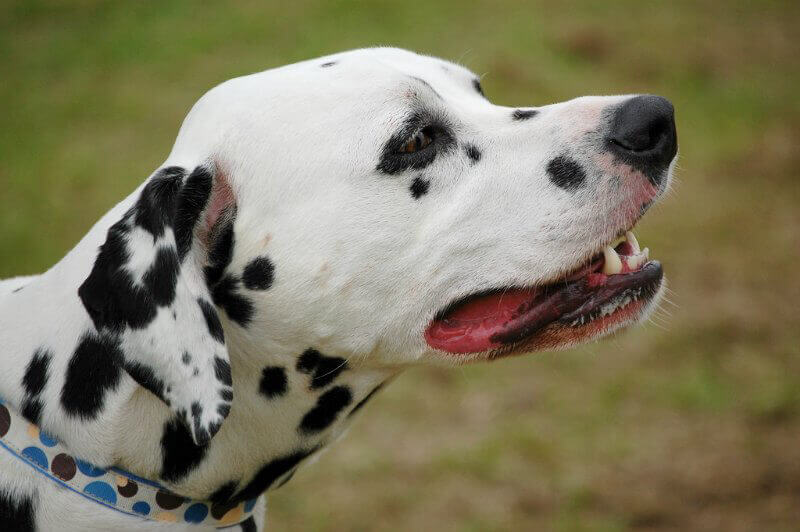
AKC breed standards stipulate that Dalmatians with large patches of color on their fur can be disqualified. However, dogs with smaller patches who “pass the test” are more likely to be deaf. Dalmatians are also genetically predisposed to higher than normal levels of uric acid, leading to increased instances of bladder stones, which are painful and cause urinary tract infections and potentially life-threatening blockages.
8. French Bulldogs

Vets say that guardians of French bulldogs can expect a lifetime of expensive medical bills because of the dogs’ tendency to suffer from these ailments:
- Brachycephalic obstructive airway syndrome
- Diarrhea
- Ear infections
- Pinkeye
- Skin Fold dermatitis
9. German Shepherds
These dogs are at higher risk from suffering from these conditions:
- Chronic pelvic pain
- Heart conditions (at least eight different types)
- Hip dysplasia
10. Golden Retrievers
Golden retrievers are at a higher risk of suffering from these conditions:
- Bone cancer
- Deadly kidney dysplasia
- Bone cancer
- Heart conditions (at least five different types)
- Melanoma of the eye and mouth
11. Labrador Retrievers

Labs have a higher risk of encountering these issues:
- Eye cancer
- Joint pain
- Skin allergies
12. Pekingese

The brachycephalic (or flat) faces of Pekingese can cause breathing problems because of shortened air passages. Like many other brachycephalic breeds, they can also suffer from proptosis, or the bulging of one or both eyeballs from their sockets.
13. Poodles

Poodles are at risk of developing problems such as these:
- A collapsing trachea
- Diabetes
- Progressive vision loss
- Seizures
14. Pugs
Pugs, a breathing-impaired breed, are 54 times more likely to suffer from brachycephalic obstructive airway syndrome—a condition that greatly limits a dog’s ability to breathe—than other types of dogs. They’re also at higher risk of suffering from the following issues, among many others:
- Diabetes and resulting exercise intolerance, leading to obesity
- Joint dislocation
- Proptosis
- Recurrent or chronic inflammation of the brain
- Spina bifida
15. Rottweilers
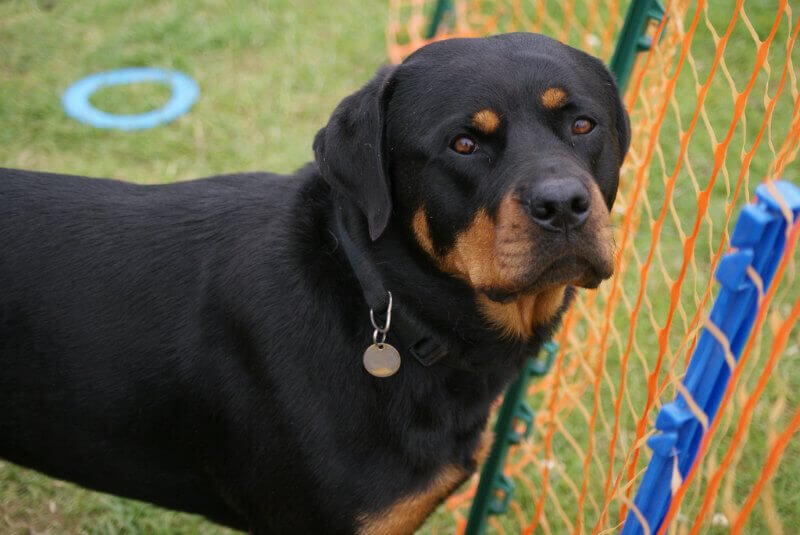
Rottweilers may suffer from these conditions:
- Certain types of cancer
- Head tremors
- Heart disease
- Nerve pain
- Uterine infections (which can be fatal if not treated quickly)
- Weakness and loss of control of the limbs
16. Shar Peis
Shar-peis are prone to frequent skin infections because of their excessively wrinkled skin and often develop hip dysplasia. Plus, because humans purposely widened their soft palates disproportionately through breeding, shar-peis are considered a breathing-impaired breed.
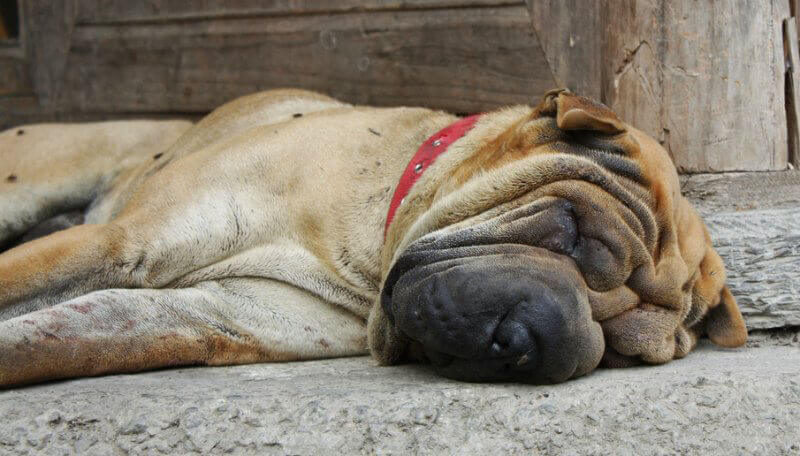
Shar-peis also often suffer from the following:
- Entropion, which occurs due to excessive amounts of eyelid skin and leads to irritation, watery eyes, and potential blindness
- Atopy, an allergic reaction that often causes excessive itchiness
- Ear infections
- Cherry eye
17. St. Bernards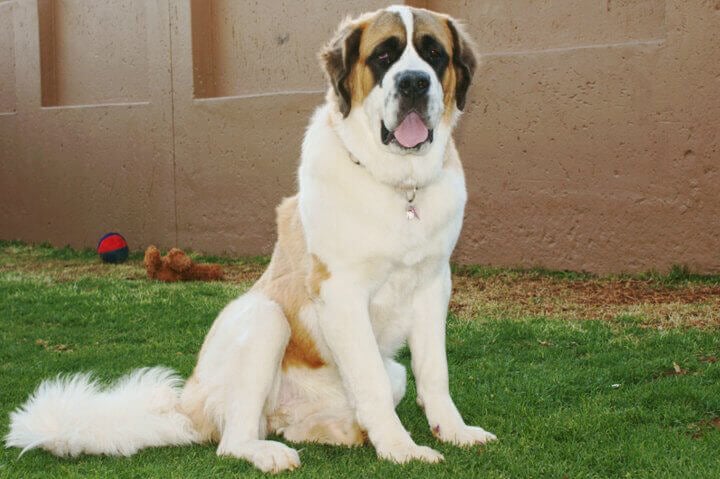
St. Bernards’ large size can lead to these problems:
- Bloat
- Heart disease
- Hip and elbow dysplasia
- Neck problems
18. Yorkshire Terriers

These terriers face a higher risk of suffering from these conditions:
- A collapsing trachea
- Chronic diarrhea
- Hepatitis
- Seizures
Merle Coats and Other Specific Characteristics
Specific coat patterns—like merle, dapples of light-colored fur on dark-colored dogs who typically don’t have multicolored coats, and “fluffy” fur on dogs who are typically short-haired (like French bulldogs)—are used by greedy breeders to profit off their “uniqueness.” Dogs are often bred with family members to increase the likelihood that specific genes will be passed on, and with this comes a higher risk for debilitating health issues such as hearing and vision impairment. Health problems can be even worse if the dog is “double merle” or both parents have the merle gene. Double merle dogs frequently suffer from skeletal, cardiac, and reproductive abnormalities in addition to other ailments common in their breeds.
What Is the Cost of Buying Purebred Dogs?
Buying a purebred dog can mean a painful lifetime of health issues for the animal and causes a dog in a shelter to lose a chance at getting a loving home. Don’t throw money at the dog-breeding industry, which clearly doesn’t care about animals’ well-being. There are millions of dogs, including purebred ones, in need of homes, so adopt from a shelter if you’re ready for the lifetime commitment.
